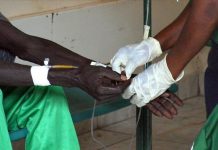AfricaPress-Tanzania: TOMORROW Christians in Tanzania join fellow Christians across the world to start Holy Week which will culminate in Easter celebration next Sunday.
During the Holy Week, the Christians commemorate the passion and crucifixion of Jesus followed by his resurrection celebrated since Saturday night (Easter Eve).
During the Holy Week and Easter season, Christians gather in large numbers in church to pray, but this year various religious leaders across the world have issued guidelines to their faithful on how to celebrate the Holy Week and Easter, while complying with government and health experts’ directives on social or physical distancing to minimise chances of contracting the coronavirus (Covid-19) pandemic.
The Muslim and other non-Christian communities too have issued guidelines to their faithful on how to protect themselves against Covid-19.
In Tanzania, in particular, this shows how the government and religious leaders cooperate in national interest issues, especially in the fight against this coronavirus pandemic, which has plagued the world and threatens our very existence, given the upward trend of coronavirus cases worldwide.
As of yesterday 13:13GMT, according to worldometer.info, there were 1,138,357coronavirus cases, 61,141 people had recovered from coronavirus, while 236,157 people had succumbed to it across the world.
By mid-last week, the number of people who had contracted this deadly disease was around over 800,000, but now it has already hit over a million patients.
This shows how the pandemic is gaining momentum despite global efforts to contain it. The threat of coronavirus is real and any person is vulnerable to it as the way is transmitted is open to all.
According to World Health Organisation (WHO), Covid-19 is an infectious disease caused by a newly discovered coronavirus.
Most people infected with the Covid-19 virus experience mild to moderate respiratory illness and recover without requiring special treatment.
However, older persons and those with underlying medical conditions like cardiovascular complications, diabetes, chronic respiratory disease and cancer are more likely to develop serious illness.
WHO recommends that the best way to prevent and reduce Covid-19 transmission is to be well informed about the Covid-19 virus, what causes it and how it spreads.
It further recommends to protect oneself and others from the infection by washing one’s own hands using soap or sanitiser as many times as one needs it and not touching one’s own face and eyes or shaking hands with family members and friends.
Let us pray to God to protect us against this deadly disease and for each other so that we may show global solidarity as we seek an effective vaccine or cure.







